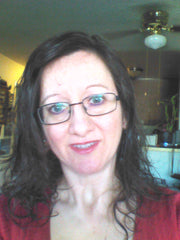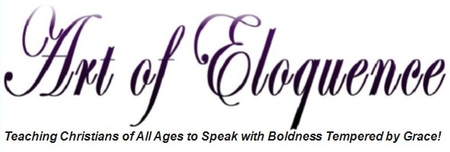Effective communication skills are important for everyone every day. Interview with a Communicator is a column I used to have here on Art of Eloquence many years ago to share how that works in the lives of different people around the world. Here is a recent interview I did with a Facebook friend, Tanya Art. Tanya leads a support group on Facebook she started three years ago. She encourages others, like herself, who deal with Fibromyalgia. She is an encouragement to others she calls Fibro Warriors.

I find that most people think of communication only in terms of formal speech and debate so I asked Tanya what role does speech and debate play in her everyday life.
I don't do a lot of talking or debating yet I have written in my blog about everyday life with Fibromyalgia and chronic pain, living for God, and other posts.
Since most people don't consider communication skills to be a large part of their life, I asked Tanya how much of her day is spent talking or in any other way communicating with friends, family, coworkers, or others during her typical day.
I don't do a lot of talking; I do most of my communicating through messenger, posting on Facebook, blogger and texting on my smartphone.
So even though Tanya doesn't spend any time in formal speech or debate and doesn't do a lot of talking person to person, she does spend a significant part of her day communicating over technological devices. So I asked her how important is communication to her relationship with her significant other?
I am not married. Yet I do believe it is very important to communicate with my boyfriend.
I asked Tanya to elaborate on how important communication is to her in her ministry and to share an example.
I think it is important to communicate even in ministry or business. The Facebook support group "Fibromyalgia: Fibro Brothers and Sisters" is the ministry I do at home since I am not able to get out as much due to my health issues. Every now and then someone will join the group that will be very argumentative and disruptive against the members. I will then send that individual a message and ask them about their disruptive comments or posts and communicate with them to see what is going on to make sure everything is okay.
Some will communicate back and we will resolve the issues. Yet there are times, some may still be argumentative and bashing people. There are times I do have to remove individuals from the group because they are disrupting and causing stress in the group. I try to have an encouraging environment because stress causes pain and symptoms to flare, which is not good for each member.
Different forms of communication require different communication skills so I asked Tanya what forms of communication she uses most and which is her favorite and why.
Facebook, Messenger, text by phone. I like Facebook the best because it is a way to communicate to people around the USA and around the world.
As we get older, our communication can change. I asked how her communication with friends/family had changed since she was a child.
I was a very compliant child that used to do mostly what I was told instead of learning to be myself. I have learned that I have a voice, I am a valuable person, and what I want matters too.
I think that is why I speak up for people now because no one did when I was a child. I learned that it is okay to share my opinions too.
Communication has changed so much in the technical and information age. I asked her how she thinks society’s attitude toward communication and communication skills have changed and if she thought it has been for the better or worse.
I have daily headaches and jaw problems so all the technology and social media helps me but I do know, in the long run, it is not as personable. I think we are talking less on the phone and not hearing an actual person's voice as much. I think it is more personable while on the phone or in person. I don't think we are as close to people when we aren't talking as much.
Having a chronic illness as we both do, I find that some doctors don't appreciate the many questions we have. Some feel intimidated by the sheer number of them. I've found that many of the doctors I've had over the years don't explain things well or at all. I asked Tanya for her experience with communicating with doctors.
When I am at the doctors or specialists office, I always bring a list of questions about my symptoms so that they know exactly what my problem is. I most likely won't forget any questions if I write it down beforehand. My doctors usually say I am always prepared for my doctor appointments. There are times that I do find a P.A. (Physician's Assistant) who does not like the notes I bring and some are intimidating. Yet I have to bring my notes so I don't forget the questions I have.
So much of customer service is outsourced to different countries where their first language isn't English. I asked Tanya to share about her experiences with customer service.
There are times when I call certain companies and the representative is in another country. Although I do like to hear people in other countries, I sometimes find it frustrating because they don't understand what I am trying to communicate about the product and vice versa. It is not their fault; it is just that we have two different ways of talking.
Being on social media, I asked Tanya to share a difficulty she encounters as a Facebook user.
Sometimes it is hard to understand the tone of a post or comment when it is written then vs. when it is spoken in person or over the phone. I think sometimes we take what people write the wrong way.
Communication skills are important for almost every aspect of our lives from our in-person conversations, phone calls, texting, email, and on social media. All of these ways of communicating require the speaker (or sender) to be clear and grace filled in their communication, but that isn't always the case. So much of our modern communication is left to chance causing misunderstandings and hurt feelings, but through the concentrated efforts to use grace and effective communication as my friend, Tanya, does, it can minimize the difficulties and enhance our experience and our friendships.
Thank you, Tanya, for sharing with my readers about your experiences!
You can connect with Tanya on her blog, Teensy Tidbits and her Fibromyalgia Support Group on Facebook!
